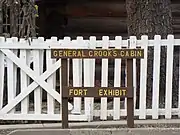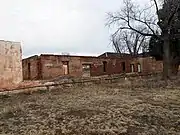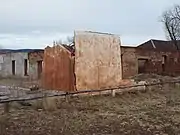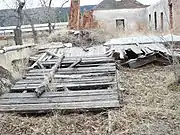Fort Apache Historic Park
Fort Apache Historic Park (Tł’óghagai in Apache) is a tribal historic park of the White Mountain Apache, located at the former site of Fort Apache on the Fort Apache Indian Reservation. The park interprets the rich and troubled history of relations between the Apache and other Native American tribes at the fort, which was converted into a Bureau of Indian Affairs boarding school after its military use ended. The park, which covers 288 acres (117 ha) of the former fort and school, as well as a nearby military cemetery, form the National Historic Landmark Fort Apache and Theodore Roosevelt School historic district.
Fort Apache and Theodore Roosevelt School | |
 The former 1876 adjutant's office, now the Fort Apache Post Office | |
  | |
| Location | Fort Apache Indian Reservation, Gila County, Arizona, US |
|---|---|
| Nearest city | Fort Apache, Arizona |
| Coordinates | 33°47′23″N 109°59′21″W |
| Area | 293 acres (119 ha) |
| NRHP reference No. | 76000377 |
| Significant dates | |
| Added to NRHP | October 14, 1976[1] |
| Designated NHLD | March 2, 2012 |
Description and history
.jpg.webp)
Fort Apache is located in the southern part of the Fort Apache Indian Reservation, about 4 miles (6.4 km) south of the reservation capital at Whiteriver just east of Arizona State Route 73. The park includes a landscape of 27 historic buildings, ruins and remnants of others, and the fort's former parade ground. The White Mountain Apache Cultural Center (Nohwike’ Bágowa, or House of Our Footprints, in Apache), is located at the western end of the park.[2] The post was situated at the end of a military road built into Apachería. Its purpose was to control the Coyotero Apaches. At first it was a temporary camp called Camp Ord later changed to Camp Mogollon, Camp Thomas and Camp Apache. It became a permanent facility in 1873 and in 1879 the name was changed to Fort Apache.[3][4]
The fort was established in 1870 as a temporary military camp, and was placed on a more permanent footing ten years later. It played a crucial role in the Indian Wars of the late 19th century, serving first as a check on Apache control of the area, and later as a recruitment point for Apaches as scouts in conflicts with other tribes. The fort was one of the places where African-American Buffalo Soldiers were stationed. Only a few buildings survive from the early years of the fort's history, including a log cabin that served as an early commandant's quarters, a guardhouse, and an adjutant's office. Barracks and other quarters built in the 1880s and 1890s also survive.[2]
Its use as a military facility obsolete, the property was in 1923 turned over to the Bureau of Indian Affairs (BIA), which established the Theodore Roosevelt School on the property. It was established as a boarding school providing educational services to several Native tribes in the region. Although it was located on Apache tribal land, the school was mainly intended to educate Navajo youth, by removing them from their reservation and encouraging the adoption of non-Native customs. This practice of the BIA was widely disliked by the tribes.[2]
During the school's boarding period (a tribal school of the same name continues to operate in some of the buildings) a variety of further buildings were added to the site, including a cafeteria, additional dormitories, and maintenance buildings. A significant number of these buildings still survive, and have been repurposed to other functions by the tribe.[2]
Historic structures of Fort Apache
| Part of a series of the |
| Cities, towns and CDPs in Arizona with lists and images of historic properties, forts, cemeteries or historic districts |
|---|
The following are images of some of the historical ruins and remaining structures in Fort Apache.
- The First Commanding Officer's Quarters a.k.a. "General Crook's Cabin" – built in 1871
- The Commanding Officer's Quarters – built in 1892
- The Captain's Quarters (102) – built in 1891
- The Captain's Quarters (103) – built in 1891
- The Officer's Quarters – built in 1883
- The Girl's Dormitory – Native-American girl's dormitory built in 1931 where the Fort's hospital once stood
- The Boy's Dormitory – Native-American boys dormitory built in 1932
- The Bureau of Indian Affairs Club House – built in 1930
- The Theodore Roosevelt School – built in 1923
- The Theodore Roosevelt School Cafeteria – built in 1948
- The Barracks ruins – built in the 1880s
- Fort ruins – c. 1880s
-1892-1.jpg.webp)
 General Crooks Cabin sign
General Crooks Cabin sign-1871-General_Crooks_Cabin.jpg.webp) First Commanding Officer's Quarters (General Crook's Cabin) – 1871
First Commanding Officer's Quarters (General Crook's Cabin) – 1871-1892-2.jpg.webp) Commanding Officer's Quarters – 1892
Commanding Officer's Quarters – 1892-1891.jpg.webp) Captain's Quarters (102) – 1891
Captain's Quarters (102) – 1891-1891.jpg.webp) Captain's Quarters (103) – 1891
Captain's Quarters (103) – 1891-1883.jpg.webp) Officer's Quarters – 1883
Officer's Quarters – 1883_Native-American_Girls'_Dormitory_(120)-1931.jpg.webp) Girl's Dormitory – 1931
Girl's Dormitory – 1931-1932.jpg.webp) Boy's Dormitory – 1932
Boy's Dormitory – 1932-1930-1.jpg.webp) Bureau of Indian Affairs Club House – 1930
Bureau of Indian Affairs Club House – 1930-1930-2.jpg.webp) Different view of the Bureau of Indian Affairs Club House – 1930
Different view of the Bureau of Indian Affairs Club House – 1930-1923.jpg.webp) Theodore Roosevelt School – 1923
Theodore Roosevelt School – 1923-1948.jpg.webp) Theodore Roosevelt School Cafeteria – 1948
Theodore Roosevelt School Cafeteria – 1948-1875.jpg.webp) Barracks ruins – 1875
Barracks ruins – 1875 Barracks Row ruins – 1875
Barracks Row ruins – 1875 Fort ruins – c. 1880s
Fort ruins – c. 1880s Fort ruins – c. 1880s
Fort ruins – c. 1880s Fort ruins – c. 1880s
Fort ruins – c. 1880s
See also
References
- "National Register Information System". National Register of Historic Places. National Park Service. January 23, 2007.
- "NHL nomination for Fort Apache and Theodore Roosevelt School" (PDF). National Park Service. Retrieved 2015-12-09.
- Frazer, Robert (1972). Forts of the West. University of Oklahoma Press.
- Prucha, Francis Paul (1964). Guide to the Military Posts of the United States. The State Historical Society of Wisconsin.